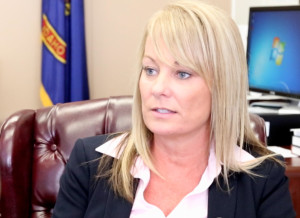In Troy, the school year is on hold — the first day pushed back from late August to Sept. 9.
 The high school football team isn’t practicing, and the Trojans might or might not take the field this season.
The high school football team isn’t practicing, and the Trojans might or might not take the field this season.
And Renae Bafus’ job is in limbo. At this point, the business and marketing technology teacher isn’t on Troy High School’s faculty. Her job could be reinstated this fall. She’s not sure she’d go back, but says she probably would.
Staff jobs and school programs hang in the balance Tuesday, when Troy voters again go back to the polls to decide the fate of a supplemental school levy. Voters rejected proposed levies in March and in May, prompting the district to write a budget that cut spending by a third.
In the process, the Troy district has become a flashpoint in the statewide debate over school funding. Closer to home, the levy debate has divided the community, and Bafus isn’t sure what to expect Tuesday. “They’re going to vote for what kind of town they have,” she said this week. “It would really break my heart if they voted no.”
Anatomy of a budget crunch
Located just a few miles east of Moscow and the University of Idaho campus, Troy doesn’t exactly fit the model of a small-town Idaho school district.
By rural Idaho standards, Troy is a low-poverty district; fewer than 30 percent of students qualify for free or reduced price lunch, compared to a statewide average of 49 percent.
But like many rural districts, Troy is struggling with declining enrollment. Last fall’s enrollment was 288, down 13 percent from 2008-09. Fewer students means less money from the state — and an increased need for money from local property taxes.
To further complicate matters, Troy’s teacher salaries are among the highest in the state. In 2014-15, the average teacher salary was $49,740, well above Idaho’s average of $44,739. Chalk this up, in part, to a competitive market; the district has to pay a little more to keep teachers from moving to Moscow or nearby Lewiston and Washington state. It’s also a function of low turnover; for years, Troy has managed to hang on to veteran teachers who have moved up the state’s salary schedule.
When the levies failed earlier this year, Superintendent Christy Castro had no choice but to cut the staffing costs that account for 85 percent of Troy’s budget. The district rewrote the budget to cut 18 positions from a staff of 50.
It isn’t the first round of cuts in Troy. In 2014, even with a levy on the books, the district cut a handful of positions. Even Castro was affected; she gave up the $12,000 pay she had received for filling the superintendent’s job (she doubled, and continues to double, as Troy’s school psychologist and special education director).
This year, Castro says, the budget cuts have been “heartwrenching,” affecting longtime educators who have taught two generations of Troy students.
On Monday, the school board drew up a plan to rehire some staffers and reinstate some programs — provided voters approve next week’s levy. Even so, the money may come too late. Some teachers have already found work elsewhere, Castro said. And if administrators can’t find qualified applicants, the district will probably wind up hiring long-term substitute teachers.
Bafus knows she could work in Moscow, Lewiston or Pullman, Wash. But after a decade at Troy High School, she feels a connection to the community. “I think our teachers want to stay here. I want to stay here.”
The statewide debate

With her job in jeopardy this summer, Bafus has put herself in the middle of the debate over school funding. And has gotten an education in the complexities of the issue.
It started last month, when Bafus wrote an open letter to state superintendent Sherri Ybarra lamenting Troy’s budget cuts and districts’ reliance on levies. “Troy is the tip of the iceberg that you can see above water. Below water are many districts operating with dangerously low and unreliable funds.” (Her letter, published on July 22, is Idaho Education News’ most read article from the past 30 days.)
Ybarra responded earlier this month, pointing out the scope of the issue. Seventy percent of the state’s districts, like Troy, are rural districts — and need more funding, and more spending flexibility.
Castro called it a “healthy exchange.” She supports Bafus’ decision to speak out. She also believes Ybarra will push for more discretionary dollars for schools. “I do believe that she’ll be true to her word.”

Bafus appreciated the response, but wonders why Ybarra is focused, in 2015, on restoring school funding to 2009 levels. “Why would you be shooting that low?”
Along the way, Bafus has received an education in school funding. She says she has learned Troy does not face a unique crisis. And now, she says, she has more sympathy for levy opponents.
“I really can’t blame them,” she said. “There comes a tipping point. … They can’t do any more.”
The local decision
Does a one-year, $995,000 property tax levy sit on one side of the tipping point, or on the other?
That’s the question Tuesday.
The recent track record provides no clear answer. In March, only 35 percent of voters approved a one-year, $1.333 million levy — far below the simple majority needed to pass. In May, the request was for $1.2 million, and the support fell short at 44 percent.
District officials point out that the $995,000 levy is not a new tax, only a continuation of the old levy. If it passes, they say, the district will have money to rehire some staff and reinstate all-day kindergarten and athletics.
But the district and the levy continue to draw close but anonymous scrutiny.
A community blog, Troy School Facts, boasts more than 28,000 hits, and questions district decisions large and small.
One post asked why a cash-strapped district provides cookies for classroom Halloween and Valentine’s Day parties.
In another, a poster calling herself “helenotroy” questions why Troy’s standardized test scores are similar to those in nearby Culdesac, even though Troy’s teacher salaries are higher. (Troy’s spring test scores are mixed. SAT scores fell from 2014 and are now below the state average. Grade school students came in below averages on the SBAC, the state’s standardized test aligned to Idaho Core Standards; meanwhile, middle school and high school students beat state averages.)
Another anonymous poster laments the hand-to-mouth nature of short-term school funding decisions.
“Putting off painful decisions doesn’t make problems disappear — in fact, it usually makes them worse. Financial problems that remain hidden for a long time have a way of emerging suddenly as full-blown financial crises.”
In Troy, the symptoms of financial crisis are widespread.
With no coaches, the football team will miss its season-opening game — no matter the outcome of Tuesday’s election. If the levy passes, the school should be able to scramble and complete the balance of its schedule. “It’ll be tight, it’ll be really tight,” Castro said.
For Bafus, the fate of her job is on Tuesday’s ballot. But she is also concerned for her adopted community. Time will heal Troy, but for now, she said, the community has been “ripped to shreds” by the series of elections.
“Our kids should not be going through this,” she said. “Our kids should be out practicing football right now.”
